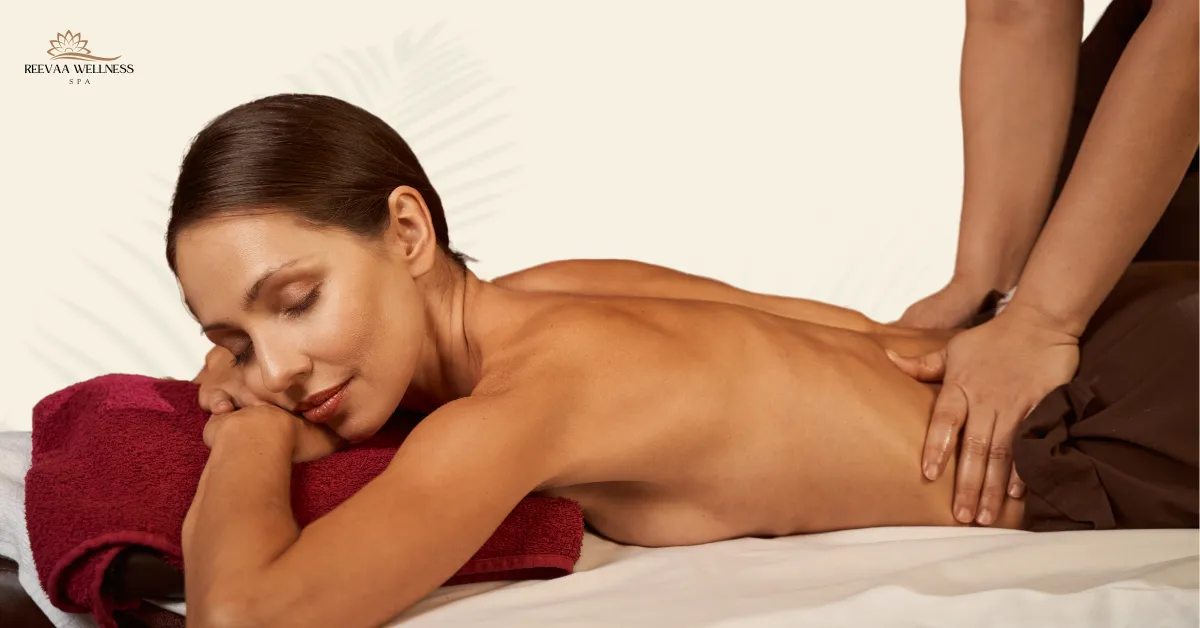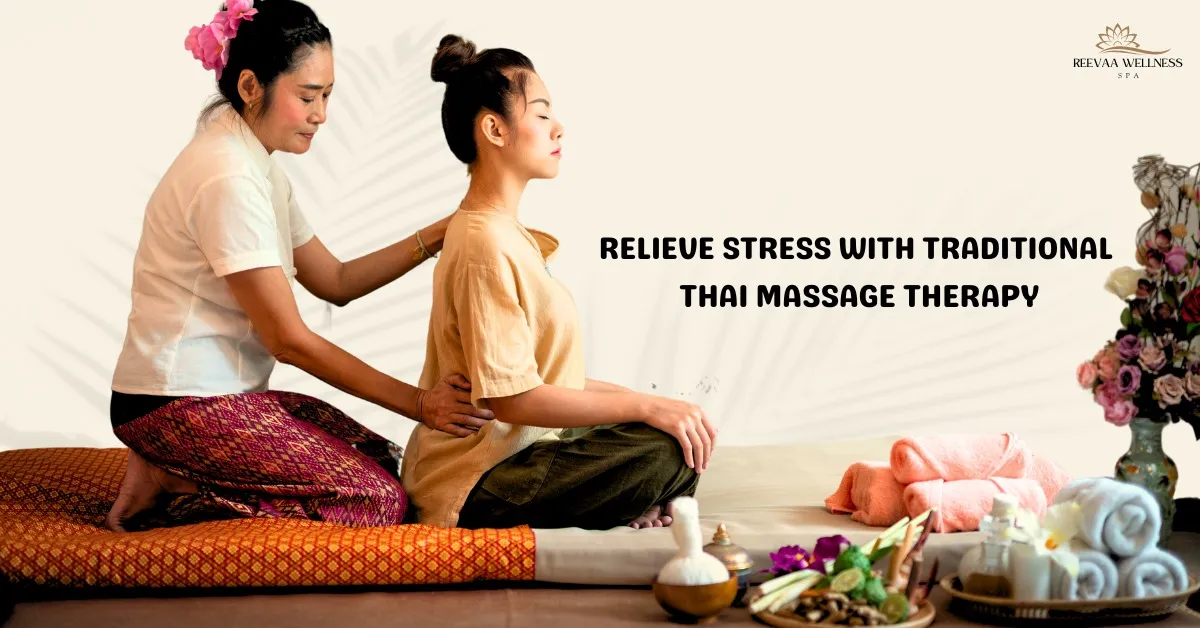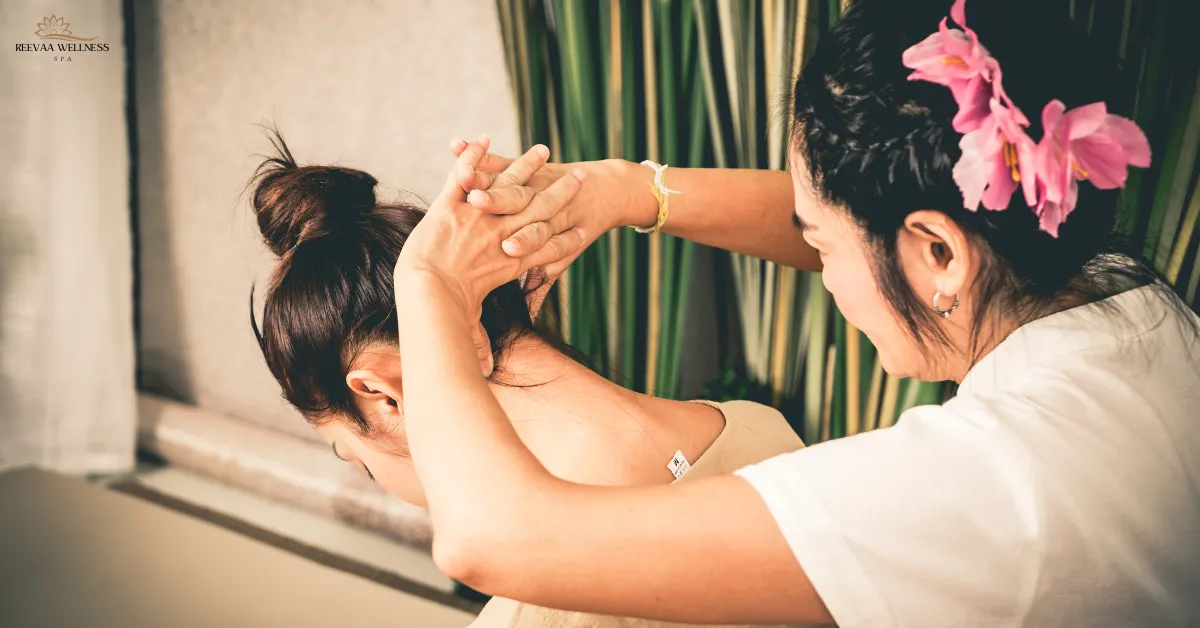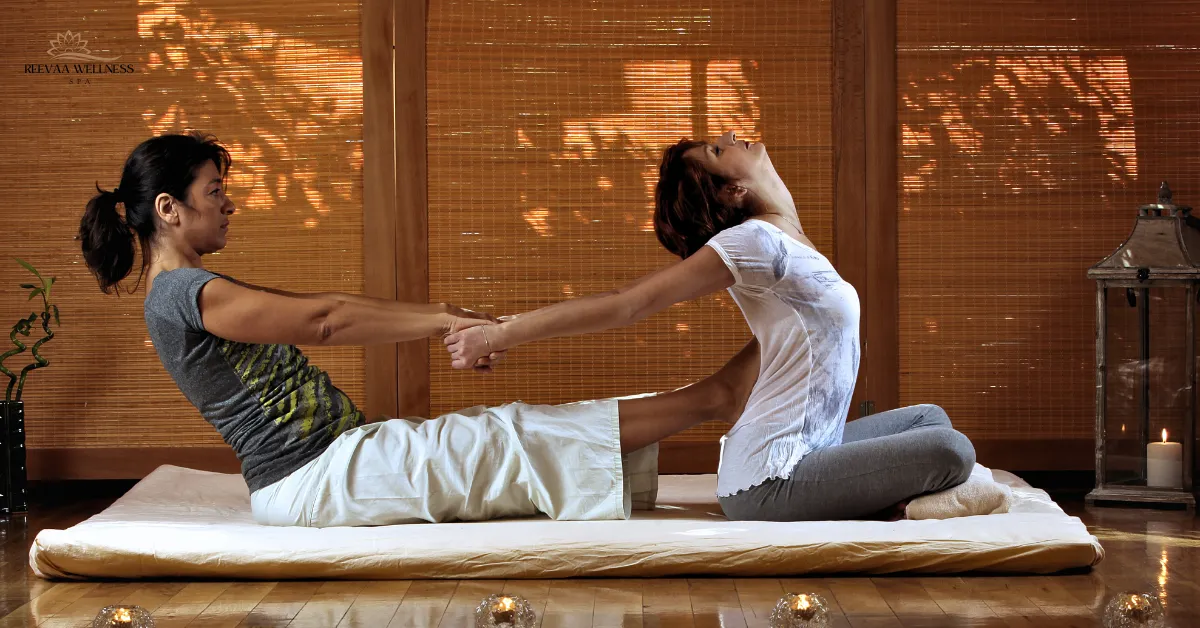Table of Contents
In today’s busy world, stress is something many of us face daily. Whether it’s work, family duties, or just the rush of everyday life, feeling overwhelmed is common. If you’re looking for a natural way to ease stress and feel better, try Thai Massage Therapy at Reevaa Wellness Spa.
At Reevaa Wellness Spa, our Thai Massage Therapy helps you relax and feel refreshed. This old technique mixes gentle pressure, stretching, and yoga-like moves to ease your body and mind. Our expert therapists will help you unwind in a calm and peaceful setting, making stress relief easy and effective.
What is Traditional Thai Massage Therapy?
Traditional Thai massage therapy is a centuries-old practice that originated in Thailand. Unlike other forms of massage, which typically involve lying on a table while a therapist applies oil and rubs your muscles, Thai massage is a more active and interactive experience. Often referred to as “yoga massage,” it combines acupressure, deep tissue massage, and assisted yoga postures to create a unique therapeutic experience.
During a Thai massage session, you remain fully clothed and lie on a mat on the floor. The therapist uses their hands, elbows, knees, and feet to apply pressure to specific points on your body. They also guide you through stretches and movements designed to release tension, improve flexibility, and enhance energy flow throughout your body.
Thai Massage Therapy Help Relieve Stress?

Promotes Deep Relaxation: One of the most immediate benefits of Thai massage is the deep sense of relaxation it provides. The combination of rhythmic pressure and gentle stretching helps to calm your mind and relax your muscles. This relaxation response can lower your heart rate, reduce blood pressure, and decrease levels of the stress hormone cortisol, leaving you feeling calm and refreshed.
Improves Circulation
Thai Massage Therapy techniques stimulate blood flow and improve circulation. Better circulation means that more oxygen and nutrients are delivered to your cells, which can help to reduce fatigue and increase your overall energy levels. Improved circulation also helps to flush out toxins, further promoting relaxation and well-being.
Releases Muscle Tension
Stress often manifests in the body as muscle tension, especially in areas like the shoulders, neck, and back. Thai massage targets these tense areas, applying pressure and stretching the muscles to release knots and tightness. The result is a significant reduction in physical discomfort and a greater sense of ease in your body.
Balances Energy Levels
Traditional Thai Massage Therapy is rooted in the belief that energy flows through the body along specific pathways known as “Sen” lines. When this energy becomes blocked or stagnant, it can lead to physical and emotional discomfort. Thai massage helps to balance and restore the flow of energy, leaving you feeling more balanced and harmonious.
Enhances Flexibility
The stretching movements in Thai massage are similar to yoga poses and can greatly improve your flexibility over time. Increased flexibility not only helps to prevent injury but also allows your body to move more freely and comfortably, reducing the physical strain that can contribute to stress.
Boosts Mental Clarity
As your body relaxes and tension is released, your mind also benefits. Many people report feeling more mentally clear and focused after a Thai massage. This mental clarity can help you manage stress more effectively and approach challenges with a calmer, more centered mindset.
What to Expect During a Thai Massage Session
If you’ve never experienced Thai massage before, it’s natural to feel a bit unsure about what to expect. Here’s a step-by-step guide to help you feel more comfortable:
Preparation
Before your session begins, your therapist will likely ask you about any specific areas of tension or discomfort you’d like to address. They may also ask about your general health and any medical conditions that could affect the treatment. It’s important to wear comfortable, loose-fitting clothing that allows for a full range of motion.
The Session
During the massage, you will lie on a mat on the floor, and the therapist will guide you through a series of stretches and apply pressure to various points on your body. The therapist uses their hands, elbows, knees, and even feet to perform the massage, applying firm pressure along your body’s energy lines.
Pressure Levels
Thai massage can be quite intense, especially if you’re not used to deep tissue massage or assisted stretching. However, it’s important to communicate with your therapist throughout the session. If the pressure is too strong or uncomfortable, don’t hesitate to let them know so they can adjust accordingly.
After the Session
After the massage, it’s common to feel a bit sore, especially if your muscles are particularly tight. However, this soreness is usually mild and should subside within a day or two. Many people also report feeling a sense of lightness and increased energy following a Thai massage.
Who Can Benefit from Thai Massage Therapy?
Thai Massage Therapy is suitable for a wide range of individuals, from those who are highly active to those who spend most of their day sitting at a desk. Here are some groups of people who might particularly benefit from this form of therapy:
Office Workers
If you spend long hours sitting in front of a computer, you’re likely familiar with the tension that builds up in your neck, shoulders, and lower back. Thai massage can help relieve this tension and improve your posture, making it easier to sit comfortably throughout the day.
Athletes
Athletes often experience muscle tightness and fatigue due to intense physical activity. Thai massage can enhance athletic performance by improving flexibility, reducing muscle soreness, and promoting faster recovery.
People with Chronic Pain
For those who suffer from chronic pain conditions like arthritis or fibromyalgia, Thai massage can offer relief by gently stretching and relaxing the muscles, reducing pain and improving mobility.
Individuals Seeking Stress Relief
Whether you’re dealing with everyday stress or more severe anxiety, Thai massage can help you find relief by calming your nervous system and promoting a sense of relaxation.
Those Interested in Holistic Wellness:
If you value a holistic approach to health and wellness, Thai massage is an excellent option. It not only addresses physical tension but also helps to balance your body’s energy, supporting overall well-being.
How Often Should You Get a Thai Massage?
The frequency of Thai massage sessions depends on your individual needs and goals. If you’re dealing with chronic stress or muscle tension, you might benefit from weekly sessions until you start to feel an improvement. For general relaxation and maintenance, a monthly session might be sufficient.
It’s also important to listen to your body and adjust the frequency of your sessions as needed. Some people find that they need more frequent sessions during particularly stressful periods, while others may only require occasional treatments to maintain their well-being.
Combining Thai Massage with Other Wellness Practices

While Thai massage is a powerful tool for stress relief, it can be even more effective when combined with other wellness practices. Here are a few suggestions:
Yoga
Since Thai massage incorporates many yoga-like stretches, practicing yoga regularly can complement your massage sessions. Yoga helps to improve flexibility, strengthen muscles, and promote relaxation, making it an ideal addition to your wellness routine.
Meditation
Meditation is a great way to calm your mind and reduce stress. Even just a few minutes of meditation each day can help you stay centered and focused, enhancing the benefits of your Thai massage sessions.
Breathwork
Deep breathing exercises can help to reduce tension and promote relaxation. Try incorporating breathwork into your daily routine, especially before and after a Thai massage, to deepen the sense of calm and relaxation.
Healthy Diet
Eating a balanced diet rich in fruits, vegetables, and whole grains can support your overall well-being and enhance the effects of Thai massage. Avoiding processed foods and excessive caffeine can also help reduce stress levels.
Adequate Sleep
Getting enough restful sleep is essential for managing stress and maintaining good health. Make sure to prioritize sleep, and consider establishing a bedtime routine to improve the quality of your rest.
Conclusion
Traditional Thai massage therapy is a powerful and effective way to relieve stress, improve flexibility, and enhance your overall well-being. Whether you’re dealing with chronic tension or just need a break from the demands of daily life, Thai massage offers a holistic approach to relaxation and healing. By incorporating regular Thai massage sessions into your wellness routine, you can experience lasting benefits for both your body and mind.
If you’re new to Thai Massage Therapy, it’s important to find a skilled therapist who can guide you through the process and customize the treatment to suit your needs. At Reevaa Wellness Spa, our qualified therapists offer expert Thai Massage Therapy, combining acupressure, stretching, and energy balancing. This unique approach is perfect for relieving stress and helping you find greater balance and harmony in your life.
Stay tuned for our next blog, where we’ll explore the benefits of Deep Tissue Therapy. If you want to learn more about our Spa and the services we offer, visit us at Reevaa Wellness Spa.
FAQ
1. What is Thai Massage Therapy?
Thai Massage Therapy is an ancient practice combining acupressure, stretching, and yoga-like movements. It involves gentle pressure and guided stretches to improve flexibility, relieve stress, and balance energy.
2. How does Thai Massage Therapy work?
During Thai Massage Therapy, you lie on a mat while the therapist uses their hands, elbows, knees, and feet to apply pressure along specific energy lines in your body. They also guide you through various stretches and movements to release tension and improve circulation.
3. Do I need to wear special clothing for Thai Massage Therapy?
You should wear loose, comfortable clothing that allows for easy movement. Thai Massage Therapy is typically done with clients fully clothed.
4. How long does a Thai Massage Therapy session last?
A typical Thai Massage Therapy session lasts between 60 to 90 minutes. The duration can vary based on individual needs and preferences.
5. Is Thai Massage Therapy painful?
Thai Massage Therapy can be intense, especially if you have tight muscles. However, it should not be painful. Communicate with your therapist about any discomfort so they can adjust the pressure as needed.



